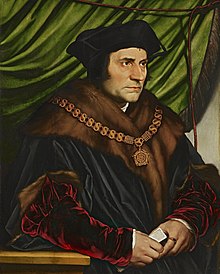Criticism of Protestantism
[3] According to both the Catholic Church and Eastern Orthodoxy, many major, foundational Protestant doctrines have been officially declared heretical.
[6] While some Catholic leaders have been seeing the positive side of the German Reformer, Martin Luther, calling him "thoroughly Christocentric"[7] and saying that his intention was "to renew the Church and not to divide it",[8] Catholic doctrine views Protestantism as "suffering from defects", not possessing the fullness of truth[9] and lacking "the fullness of the means of salvation".
"[20] Many centuries later, in 1999, the Pontifical Council for Promoting Christian Unity and the Lutheran World Federation have found basic doctrinal agreements in the Joint Declaration on the Doctrine of Justification,[19] showing "a common understanding" of the justification:[19] "By grace alone, in faith in Christ's saving work and not because of any merit on our part, we are accepted by God and receive the Holy Spirit, who renews our hearts while equipping and calling us to good works.
"[19] The document states that the churches now share "a common understanding of our justification by God's grace through faith in Christ.
[21][22] Although an important step forward in the Catholic–Lutheran dialogue, the Declaration continues to show the unsurpassable differences of thought that separate the Catholic Church from the Protestant tradition.
[19] Lutherans uphold Luther's doctrine that "human beings are incapable of cooperating in their salvation... God justifies sinners in faith alone (sola fide)."
[25] The Vatican's note in response to the Declaration said that the Protestant formula "at the same time righteous and sinner", is not acceptable: "In baptism everything that is really sin is taken away, and so, in those who are born anew there is nothing that is hateful to God.
[35][36] Baptists,[37][38] Anabaptists,[39] the Plymouth Brethren,[39] Jehovah's Witnesses,[40] and other Restorationist Protestant denominations affirm that the Lord's Supper is a memorial of Jesus' death,[39] and consider the belief in the real presence of Christ to be crypto-papist, unbiblical or a misinterpretation of the Scriptures.
"[46] In response to Adam's accusation towards Protestantism, the church historian and Protestant theologian Wilhelm Pauck pointed out that "In summing up ... the Roman Catholic criticism that the Reformation and Protestantism resulted from a revolt against the Church, we conclude that the Roman Catholic leaders of the sixteenth century are not without responsibility for the break-up of Christian unity",[46] therefore the Schism between Protestants and Catholics was an inevitable consequence of the Protestant Reformation for which both sides have to be considered responsible.
A report issued by Christian Ministry Resources (CMR) in 2002, stated that contrary to popular opinion, there are more allegations of pedophilia in Protestant congregations than Catholic ones, and that sexual violence is most often committed by volunteers rather than by priests.
Moreover, the Royal Commission did not include allegations in the period 1950 to 1977 with respect to the Presbyterian, Congregational and Methodist communities which folded into the Uniting Church in 1977.
Allegations against the Jehovah Witness religion, on a per capita basis, are dramatically higher than for either the Catholic or the Uniting churches.




